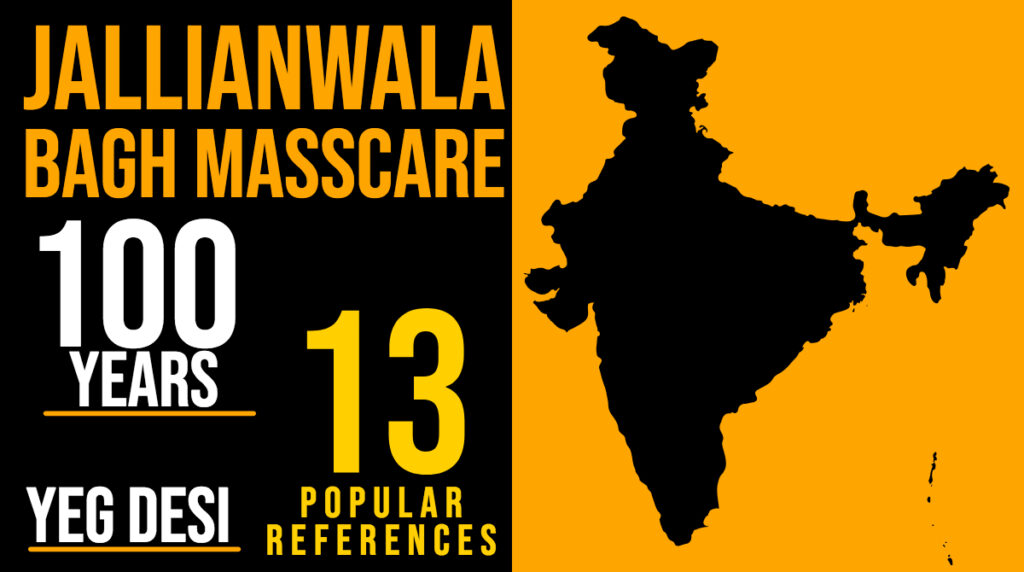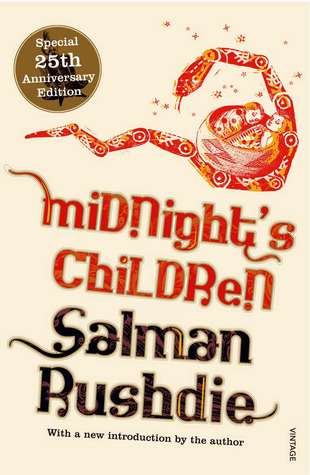13 Popular References to Jallianwala Bagh Massacre

13th April 2019 marked 100 years of the Jallianwala Bagh Massacre- one of the bloodiest military action by the British Indian forces on innocent people attending a protest in Jallianwala Bagh (Amritsar). The following list looks at 13 Popular references to the Jallianwala Massacre and the apologies from British representatives so far.
1.) Jallianwalla Bagh Mein Basant (1932) (Poem)
One of the known early works on this subject is a Hindi poem by Subhadra Kumari Chauhan in her anthology Bikhre Moti (Scattered Pearls). The poem is recited in the following video.
8 Facts about Canadian Cricket Team)
2.) Jallian Wala Bagh (1977) (Bollywood Film)
This Balraj Tah directorial had screenplay written by Gulzar. It starred Vinod Khanna, Parikshat Sahni, Shabana Azmi, Gulzar and Deepti Naval. It is a part-biopic of Shaheed Udham Singh who
3.) Midnight’s Children (1981) (Novel) / Midnight’s Children (2012) (Movie)
The people were sticking up for their rights, but England wasn’t going to take this one lying down. This massacre happened because of the protests against Rowlatt Act protests. Brigadier General Reginald E. H. Dyer fired on a meeting of around 20,000 people in Jallianwala Bagh square, and between three hundred and a thousand people died, with many more wounded.
You will probably remember this as the scene where Aadam Aziz sneezes and it saves his life, but he comes home covered in blood.
A few shots of the massacre are captured in the movie Midnight’s Children, a Canadian-British film adaptation of Salman Rushdie‘s 1981 novel of the same name directed by Deepa Mehta.

4.) Gandhi (1982) (Hollywood Film)
Probably one of the best shot and portrayed in less than 6 minutes, you can feel the tension, drama and the pain of everyone involved. Directed by Richard Attenborough, Gandhi was a biopic on Mahatma Gandhi. General Dyer was played by Edward Fox
5.) Shaheed Uddham Singh Alias Ram Mohammad Singh Azad (2000) (Punjabi Film)
This Chitraarth directed film that had Gurdas Mann and Raj Babbar in lead is a biopic on Uddham Singh and
(also read: First Sikh Wedding in North America)|
8 Facts about Canadian Cricket Team)
6.) The Legend of Bhagat Singh (2002) (Bollywood Film)
This Rajkumar Santoshi directed film was the second closest to Richard Attenborough’s recreation of the massacre. In the movie, Freedom Fighter Bhagat Singh is said to be inspired to become a revolutionary after the incident.
7.) Rang De Basanti (2006) (Bollywood Film)
There are portions of the Hindi film Rakesh Om Prakash Mehra’s Rang De Basanti that depict the massacre and the influence it had on the freedom fighters. It is a rather dramatic and painful portrayal of the incident and shows how Bhagat Singh, the revolutionary was born.
8.) City of Ghosts (2009) (Novel)
City of Ghosts, is partly set around the massacre, blending fact with fiction and magical realism. Dyer, Udham Singh and other real historical figures feature in this story. It’s 1919 and Amritsar is a city on the brink of rebellion. Riots, violence and tension spill onto the streets. Bissen Singh fought bravely for the British Empire during World War One. Now he waits patiently for news from England. Gurdial, a young orphan, is desperate to marry Sohni, the daughter of a rich and evil man. And Jeevan, Gurdial’s oldest friend, is swept up in the revolution and changing beyond all recognition. Bissen, Gurdial and Jeevan are looking to the future whilst trying to escape ghosts from the past. But as the fight for Amritsar reaches a terrifying climax, their lives will be changed for ever. An epic story of love and life, war and death from multi-award-winning author Bali Rai.

9.) Phillauri (2017) (Bollywood Movie)
Now if you plan to watch this film, maybe you should stop here (*Spoiler alert*) but the reference to the

10.) Channel 4’s “The Massacre That Shook the Empire” (2019)
Writer Sathnam Sanghera examines the 1919 massacre and its legacy in British Channel 4’s documentary The Massacre That Shook the Empire.
12.) Khooni Vaisakhi (Poem by Nanak Singh)
One of Punjab’s greatest novelist Nanak Singh wrote a poem on the Jallianwala Bagh massacre called Khooni Vaisakhi from his own experience being on location as a kid. The poem was originally banned and
13.) Several Punjabi songs depicting Jallianwala Bagh massacre
There are quite a few Punjabi songs that have depicted the Jallianwala Bagh Massacre, however some of the most popular ones are added below.
(also read: First Sikh Wedding in North America)|
8 Facts about Canadian Cricket Team)
Although there’s hasn’t been a formal apology about this incident, there has been some close encounters though
British Prime Minister Theresa May on April 10, 2019, called the Jallianwala Bagh massacre a ‘shameful scar’ on British-Indian history.
On April 11, 2019, Pakistan endorsed the demand that the UK Government must apologise for the Jallianwala Bagh massacre and the famine of Bengal.
In January 2017, Congress MP Shashi Tharoor while speaking on his book ‘An Era of Darkness: The British Empire In India’, said that the Jallianwala Bagh centenary in 2019 will be a ‘good time’ for the British to apologise to the Indians.
In December 2017, London Mayor Sadiq Khan, who is of Pakistani-origin, also said that the British should apologise for the Jallianwala Bagh massacre in Amritsar. Khan was on a three-day India tour and visited the Jallianwala Bagh complex.
In October 1997, Queen Elizabeth and her husband Prince Phillip visited Jallianwala Bagh, but no apology for the massacre was offered.
In February 2013, British Prime Minister David Cameroon visited Jallianwala Bagh offered regrets over the massacre but no formal apology was offered.
